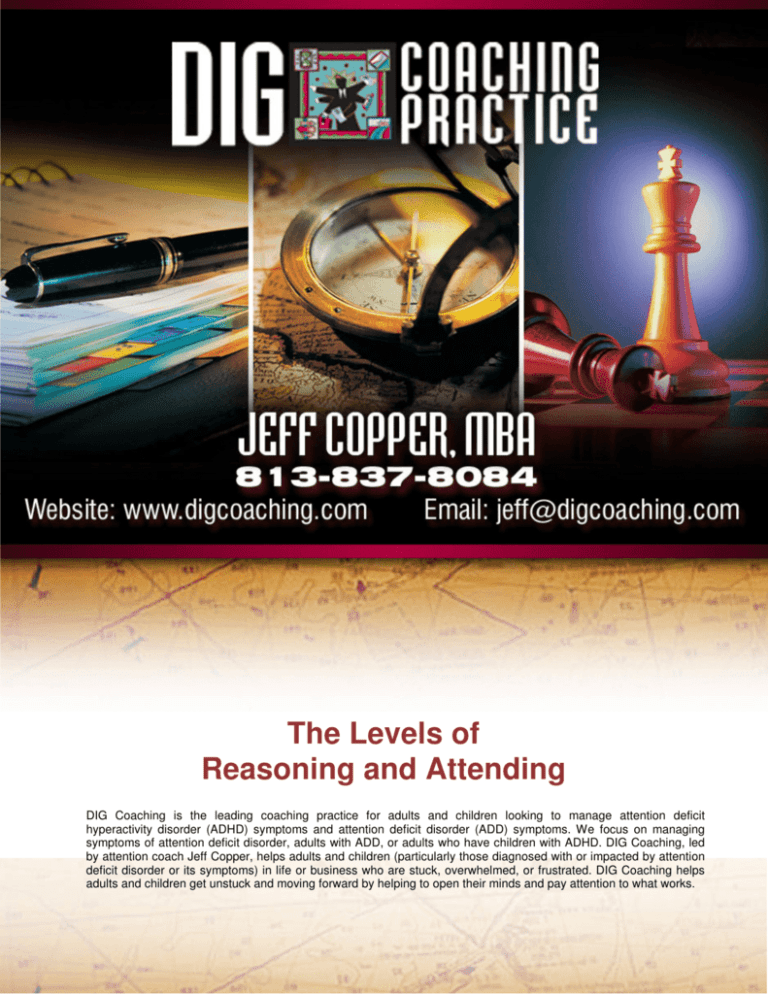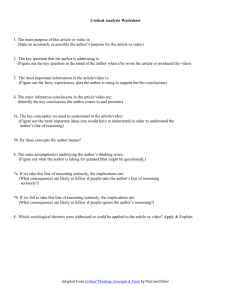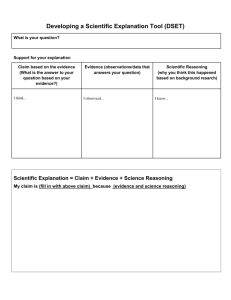
The Levels of
Reasoning and Attending
DIG Coaching is the leading coaching practice for adults and children looking to manage attention deficit
hyperactivity disorder (ADHD) symptoms and attention deficit disorder (ADD) symptoms. We focus on managing
symptoms of attention deficit disorder, adults with ADD, or adults who have children with ADHD. DIG Coaching, led
by attention coach Jeff Copper, helps adults and children (particularly those diagnosed with or impacted by attention
deficit disorder or its symptoms) in life or business who are stuck, overwhelmed, or frustrated. DIG Coaching helps
adults and children get unstuck and moving forward by helping to open their minds and pay attention to what works.
The Levels of Reasoning and Attending
By Jeff Copper, Manager & Head Coach, DIG Coaching Practice LLC
In order to pay attention to
anything or pay attention to
something differently, we must
have an idea of what we are
looking at. At DIG Coaching,
we define “attending” as
paying attention to what we
are paying attention to. Part of
attending is thinking about
what we are thinking or the
kind of reasoning being used.
In this article, we look at the
different kinds of reasoning to
help us understand what reasoning to pay attention to
when we are attending.
Intuition
Intuition is the act or faculty of knowing or sensing
without the use of rational processes. Intuition is the
immediate apprehension an animal feels when its
instinct senses the presence of a predator or danger.
Dictionaries define “intuition” as:
• Direct perception of truth, fact, etc., independent
of any reasoning process.
• Knowledge gained by the use of this faculty.
• A sense of something not evident or deducible.
• An immediate cognition of an object not inferred
or determined by a previous cognition of the
same object.
• Pure, untaught, noninferential knowledge.
To me, intuition is the next level of reasoning, and to
me, it is reasoning based on instinct.
REASONING
As a coach, I have come to differentiate the levels of
reasoning. In attending to reasoning, I have constructed
a mental model to put reasoning into a context I can
understand. The model has four levels of reasoning,
from no reasoning to the more analytical or cerebral
level. Let’s look at the four levels in more detail.
Instinct
Humans, along with all other animals, are hardwired
(preprogrammed) with a set of basic instructions when
they are born. These instructions are our instincts.
Dictionaries define “instinct” as:
• An inborn pattern of activity.
• A natural or innate impulse, inclination, or
tendency.
• A natural aptitude.
• A powerful motivation or impulse.
• An innate capability or aptitude: an instinct for
tact and diplomacy.
We all understand instinct and the role it plays, but few
of us actually pause to notice and appreciate it. Instinct
explains why carnivores don’t eat plants, what drives us
to procreate, and why humans naturally pay attention to
what interests them. In its most basic form, instinct is the
absence of reasoning.
Insight
Insight or insightful thinking is the sudden and immediate
comprehension or understanding that takes place
without overt trial and error. It occurs when people
recognize relationships, or make novel associations
between objects or actions, that can help them solve
new problems. Insightful thinking is the understanding of
the motivational forces behind one's actions, thoughts,
or behavior. Characteristically, insight is:
• The comprehension of something after seeing it
in a different light and comes when we pay
attention to things differently or realize we were
paying attention to the wrong thing.
• The process of making unexpected
associations.
• The process of discovery, of paying attention to
things differently.
Insight is reasoning when we don’t know what to pay
attention to. This level of reasoning is more cerebral. It
differentiates us from other animals. Insight gives us the
ability to pay attention to things other than our instinct or
intuition, to see and comprehend things by paying
attention to them differently. For example, insight
enables us to see our world as round (not flat) and
realize we are not at the center of the universe.
Methodical/Analytical Thinking
Methodical thinking is thinking or acting in a systematic
or sequential way, proceeding systematically, without
trial and error, by adhering to a predetermined method,
system, or known relationship. Characteristically,
methodical thinking:
• Is the holy grail of science.
• Means applying known relationships or things
associated with each other.
• Removes the need to think or discover.
Methodical or analytical thinking is the highest level of
reasoning. It allows us to observe patterns in nature,
define the laws of science and our physical world, and is
reasoning based on our individual experience or
knowledge or inherited experience or knowledge.
Methodical reasoning is commonly associated with
science as we know it.
Summary
This mental model has four levels of reasoning: instinct,
which is the absence of reasoning; intuition, which is
reasoning based on instinct; insight, which is reasoning
when we don’t know what to pay attention to, and
methodical reasoning, which is based on prior
experience or knowledge or inherited experience or
knowledge.
ATTENDING
Methodical or analytical thinking is the dominant form of
reasoning in our culture today. I find most people have
surrendered their control of what they pay attention to.
They rely on the top 10 list of obvious solutions, the
experts, or methodical thinking, applying solutions as if
they were the same as everyone else’s. In the end,
society (and corporate America) largely directs our
attention to the "solution of the day" with no regard for
the unique individuals we are.
What is not obvious to most but is obvious to me is that
coaching as an industry was born from the need for
individuals to:
• Reclaim control of what they pay attention to.
• Embrace other forms of reasoning in situations
where things are not the same.
• Pay attention to what is instinctive and what is
intuitive.
• Use insightful thinking when things are different
or unique.
Let’s face it; our world is getting more cerebral and less
physical. More and more, our lives and work product
resonate more from our thoughtful brain and less from
our physical manifestations. The shift from a physical to
a more cerebral world inhibits the ability of others to
observe and measure our unique thought patterns,
beliefs, and differences. Increasingly, we need to
become dependent on witnessing, interpreting, and
questioning our own individual mindful brain. Why?
Because we each need to be our own scientist simply
because we are each different. You see, when the
obvious methodical thinking solution isn’t working, it is
because we are different from others, not the same. So,
when methodical reasoning isn’t working, we need to
pay attention to the other forms of reasoning (instinct,
intuition, and insight). As we rely on our thoughtful brain,
our differences, limiting beliefs, misinterpretations, and
self-defeating miscalculations become ever more
apparent and problematic in our less physical, more
cerebral world!
So, at its most basic level, “attending” is defined as
paying attention to what we are paying attention to. To
do this, we must quiet the rational (methodical) mind
and pay attention to the intuitive mind. To attend to
our thoughts, beliefs, instincts, intuition, and insightful
reasoning, we must pause and ponder; observe
when we act with reasoning and without it. It is about
pausing and thinking about what we think about and
noticing what we are not paying attention to. To attend
is to do so curiously, we need to be curious; ask
questions by paying attention to our hardwiring
(instincts) as clues reveal our dominant programming.
CONCLUSION
The skill of attending is the process of (how we go
about) finding solutions based on how we are each
different. To be effective, we must understand the
different levels of reasoning. The key to attending is to
let go of methodical reasoning and to recognize and pay
attention to the other creditable forms of reasoning
(instinct, intuition, and insight). Further, another key to
attending is to acknowledge that instinctive reasoning
and intuitive reasoning provide clues to how we are
naturally hardwired (how we are individually
programmed). Paying more attention to these forms of
reasoning will help us understand how we naturally work
and will direct our attention to obvious solutions based
on that understanding.
© 2010 DIG Coaching Practice LLC. All rights reserved.
All references to clients are used with permission.








